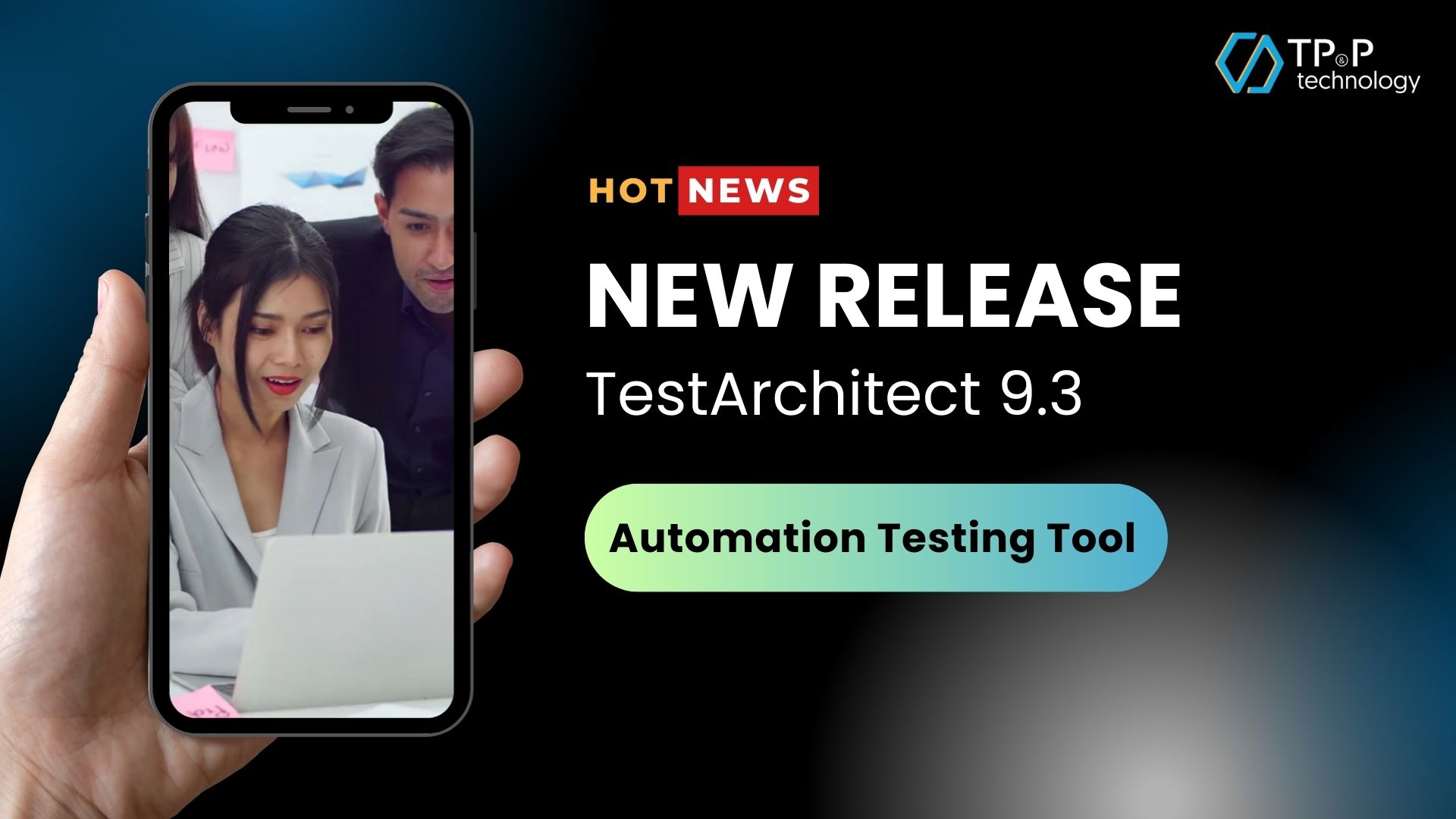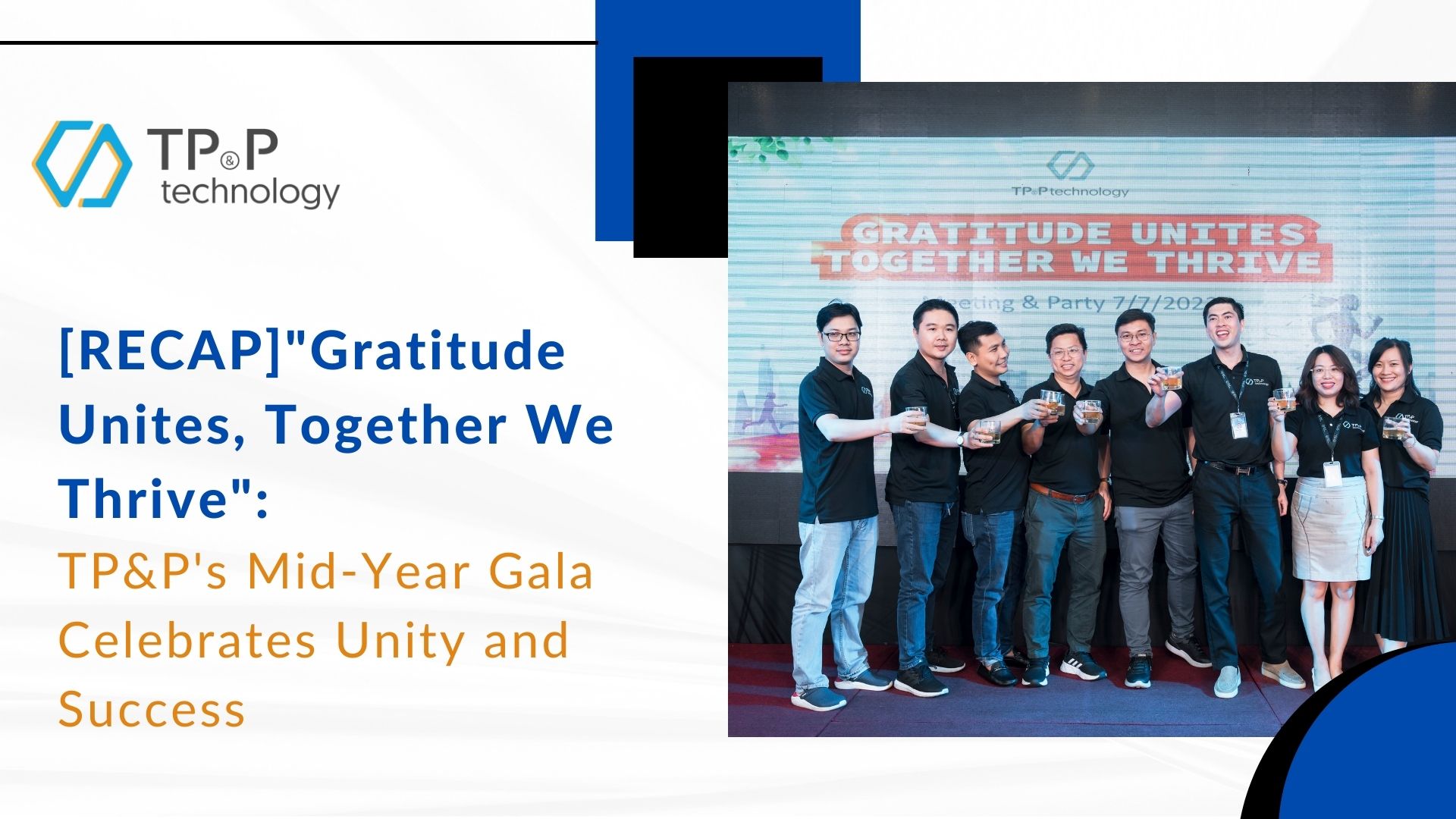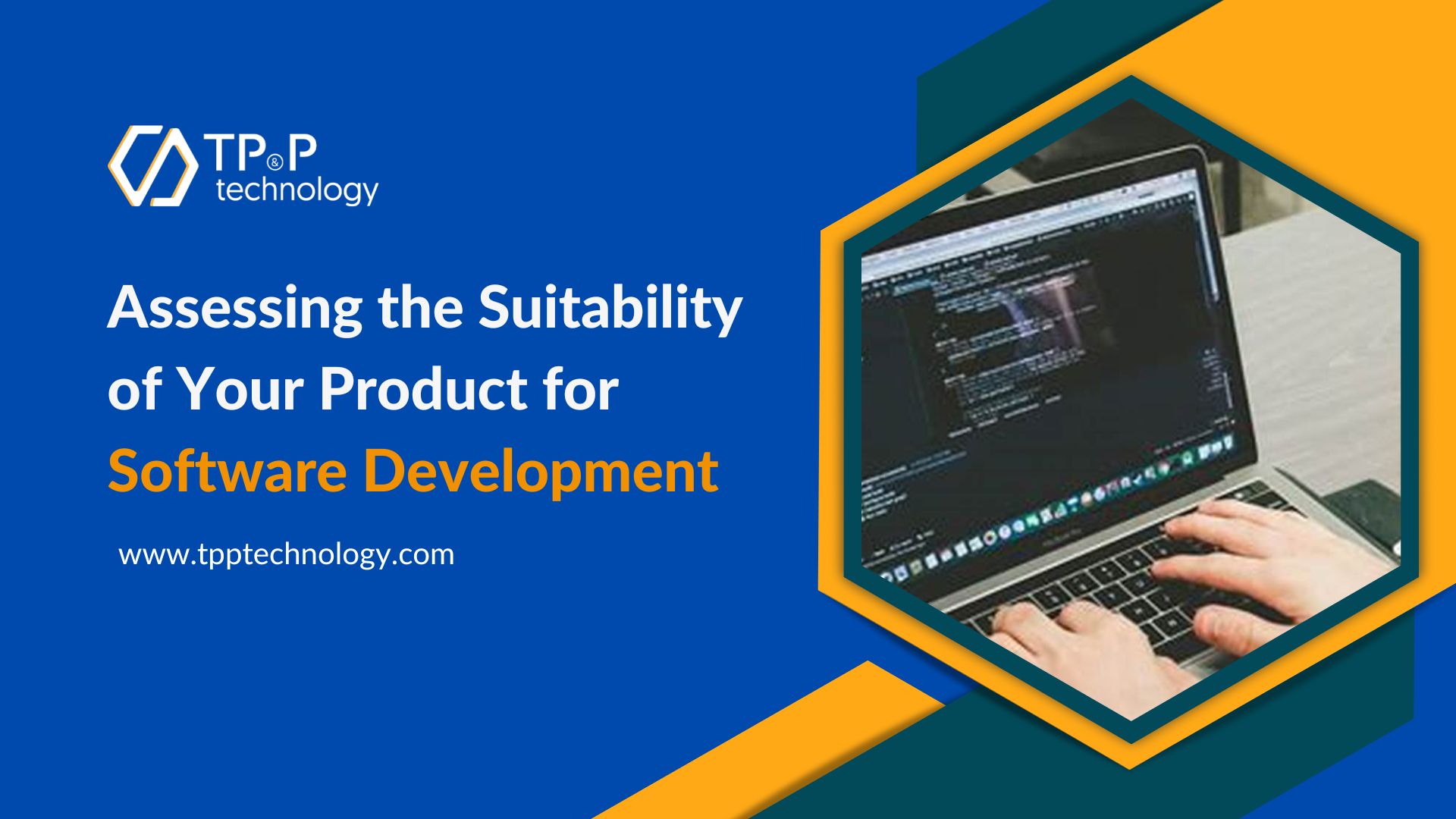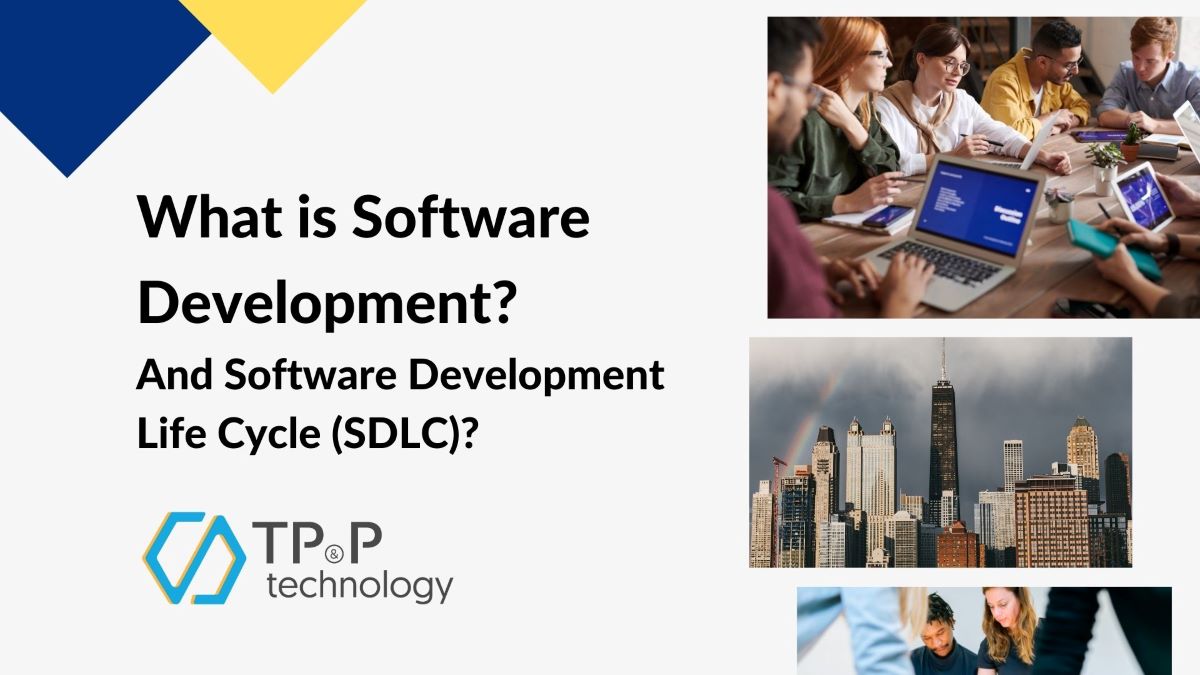
What Is Software Development, And SDLC (Software Development Life-Cycle)?
What is Software Development?
Simply put, software development refers to an overall process that programmers undertake to design, develop, and deploy computer programs. The series of steps undertaken by the dev team to create software is collectively described as the Software Development Life Cycle (SDLC), which consists of programming and other activities associated with computer science needed to build and deliver a product that meets the technical and business requirements.
The SDLC offers a framework that software developers and engineers can use throughout the project to develop and deliver (and go live) their software applications. Specifically, by following the clearly defined stages of the SDLC, all the software project team members can have a shared understanding of the responsibilities, goals, and timelines of the project, which ultimately enables the team to deliver high-quality software on time as expected.
Each stage of the SDLC generally brings out the deliverables needed to perform the next step in the software development life cycle. Here, the collective work of software development isn’t limited to only the work done by software developers and software engineers. Other (IT) professionals may also involve in the development process.
Stages Involved in The Software Development Procedure
As said above, SDLCs are the essential steps that all software developers and engineers have to undertake, from the beginning to the end, when developing software. As a general rule, the SDLC process includes six steps:
- Requirement analysis
- Design
- Software development
- Testing and Run Quality Assurance
- Deployment of final code
- Maintenance
Let’s take a closer look at each step as follow:
1 - Requirement Analysis
Before programmers and coders can start writing the very first line of code to build the software applications, it is necessary to gather the requirements to understand what is required by users and other project stakeholders. Here, the software development team members and project stakeholders agree on the technical specifications and user requirements of the product.
At this stage, the outline and details of the project scope will be established and documented, together with the responsibilities of all development team members, including software architect(s), developers, engineers, QA/ Software testers, Business Analysts, UI/UX designers, etc. so that the common project goals can be achieved in a timely manner.
This is also the stage where the project manager and developers finalize the development methodology (e.g. Waterfall, Agile, etc.). The deliverables of this requirement analysis stage are documented in a document namely “Software Requirement Specification” for the team to consult throughout the entire development process.
2 - Software Design:
This is the second stage of the software development process. From the user requirements and specifications established in the previous step, software architects and developers will map out the overall architecture needed to create the software. Various aspects such as budget, timeline, chosen tech stacks, team compositions, etc. are all taken into consideration.
The deliverables of this step provide developers, testers, and programmers with a template that specifies the architectural design, system requirements as well as back-end, and front-end representation, etc., allowing the team to follow throughout the entire development process.
3 - Coding/Implementation:
After having the Design Specification Document (DSD), the team will embark on writing code and developing the software, based on the specifications in the previous stage. Simply put, at this stage, front-end developers will build the interface (which is everything end-users see when they use the software application) and back-end developers work on the server-side programming, together with database administrators handling the database requirements. The developers usually review their own codes and others’ codes during this stage.
This particular stage usually takes up most of the time and resources of the entire development process.
4 - QA & Software Testing:
QA processes are carried out at this stage. Depending on the project, this may include development QA (including code review, unit testing) and software testing activities like functional, integration, regression testing, etc. as well as non-functional testing and test automation, etc. The main goal for testers and software QA is to verify and ensure the product work as intended according to predefined scenarios and specifications.
Testers and software QAs will inform developers of any product defects or bugs detected during the testing process and developers take action to fix the bugs as necessary.
5 - Deployment Stage:
After the testing stage when the software is finally free of errors and defects, developers will deploy the product onto the production environment and deliver it to the customers. Once signing off, beta testing can be done to gain feedback from actual customers and end-users, ensuring the software perform at a high level on a large scale. Proper planning, including a roll-back plan, needs to be prepared in advance in case anything goes wrong.
6 - Maintenance:
Once the production version goes live, and customers start using the high-quality software, the next step is to sustain and maintain the product, manage and resolve any issues that end-users encounter as well as modify and update software applications after deployments, including bug fixing and system performance improvement.
Software Development Life Cycle (SDLC) Process Models
Generally speaking, when it comes to software development, these development process phases remain the same; however, the software development team can implement functions at each stage in various ways. These are called SDLC methodologies. Each methodology uses a different hierarchy to perform the development process differently.
Today, there are several types of SDLC models are in use, but only eight main kinds of SDLC methodologies you should know since they’re the most popular models. Still, all development models’ common goal is to help engineers effectively create high-quality software.
Generally, the software development model chosen for a specific project depends on factors like the level of expertise required, business requirements, timeline, and budget. Therefore, to make a well-informed decision, software engineers should try to understand all the methodologies of SDLC.
Here is the outline of popular SDLC models.
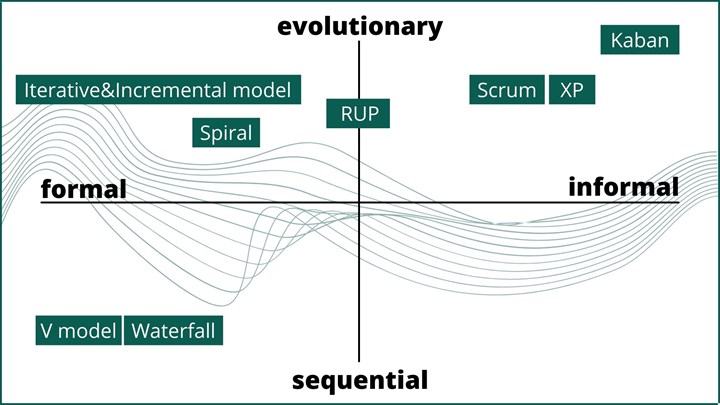
The SDLC models in the lower left quadrants of the chart are easier to implement, use and manage since they take the sequential flow; the higher they are on the map, the more flexible they are when the process needs to be changed in the future.
The methodology on the left side of the chart indicates low customer engagement, as you move further to the right side, the models will be more cooperative and engage customers more in different stages of the software development life cycle.
Types of SDLC Models
As you can see, the eight types of SDLC methodologies are Waterfall, V Model, Incremental Model, Spiral Model, RUP, Agile Scrum, XP, and Kanban.
Waterfall
The Waterfall model follows through all development stages: analysis, design, coding/implementation, testing, deployment, and maintenance, respectively. Each phase has specific delivery deliverables and is strictly documented. The next step cannot start before the previous one is completed.
Therefore, for instance, software requirements cannot be re-assessed during the development/coding stage. It is also impossible to view and test the software until the last deployment phase is completed, which leads to higher project risks and unpredictable project outcomes. Testing is usually rushed, and fixing errors is costly.
This model can be used in:
- Small and medium-sized simple projects (developing small companies’ websites) with clearly defined and unchanging requirements.
- Projects that require tighter controls, predictable budgets, and timelines are like government projects.
- Projects that adhere to a variety of rules and regulations like healthcare projects.
- Projects using well-known technology stacks and tools.
V-Model (Validation and Verification Model)
The V-model is a linear model with each stage having a corresponding test run. Workflow organization means excellent quality control, but at the same time, it makes the V-model among the most expensive and time-consuming models.
Additionally, although defects in the requirements specification, code, and architecture errors can be found early, changes during the development process are still expensive and challenging. Like the Waterfall model, all requirements are gathered and summarized from the beginning and cannot be changed.
This model can be used in:
- Projects that require no errors and downtime like medical software or flight management software.
Iterative and Incremental model
The SDLC, which is based on the Incremental model, is divided into multiple iterations. New software modules will be added in each iteration with no or little changes to the previously added modules. The development cycle can be sequential or parallel. Parallel development adds to delivery speed, while multiple iterative development cycles can make the project lengthy and costly.
With Iterative development, software changes in each iteration, development, and evolvement. Since each iteration is built on the previous iteration, the software design remains consistent.
Since the software is distributed in parts, there is no need for a complete specification from the beginning of the project, and subtle changes to requirements may occur during the development process. However, the requirements cannot be changed entirely - the necessary conditions must be defined from the beginning, especially for system design in incremental development, because additional integration of distributed software may become a problem.
Some minor requirements may need to be altered during the development process; the SDLC model can require some customers’ participation.
This model can be used in:
- A large-scale and lengthy development project that required basic functionality delivery fast using microservices, or web services.
Spiral model
This model focuses on a comprehensive risk assessment. Therefore, to make the most out of the Spiral model, you’ll have to engage people with s solid background in conducting a risk assessment. Typically, the Spiral cycle lasts around six months and starts with four key activities - comprehensive planning, risk analysis, prototyping, and review of previously delivered parts. The repeated spiral cycle significantly extended the project timeframes.
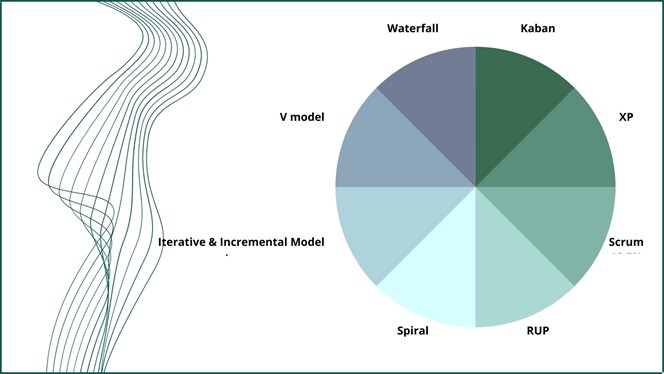
This is the model with a lot of customer involvement. They can participate in the exploration and review phase of each cycle. During the development phase, customer modifications are not acceptable.
This model can be used in:
- Projects with unclear business needs/innovations or too ambitious
- Large and complex projects
- Research and development (R&D) or introducing new services or products.
RUP (The Rational Unified Process)
The Rational Unified Process (RUP) is a combination of a linear framework and an iterative framework. This model divides the software development process into four phases - inception, elaboration, construction, and conversion. Except for the first phase, each step usually has multiple iterations. All basic operations ( requirements, design, etc.) of the development process are executed parallel across the four RUP stages, although the intensity is different.
This model helps to build flexible and, at the same time, stable solutions; however, the model is not as fast and adaptable as the ones in the Agile group (we’ll explore later). Customer engagement, document strength, and repeatability length can vary according to project needs.
This model can be used in:
- Large-scale and high-risk projects, use-case-based development, and fast development of high-quality software.
Agile Methodologies
The next three SDLC methodologies are falling under the umbrella of Agile methodologies. The premier global survey of project management practitioners conducted by PMI, Pulse of the Profession 2017, revealed that 70 percent of organizations had adopted the Agile approach in their IT projects. In simpler words, the Agile approach focuses on iterative development, constant communication, and early customer feedback for better improvement.
Each Agile iterative process usually takes several weeks to deliver a complete software version. This group’s models focus more on providing a functioning part of the application and software testing activities rather than detailed software documentation (detailed requirement specification, detailed architecture description).
This enables rapid development, but because there is no detailed software description, the maintenance phase is complicated as more time is needed to find out the problem.
Another thing about the Agile model is that it’s all about working closely both across the team and with customers. Stakeholders can review the development progress and give revaluation of the priority of tasks for the future iteration to increase the ROI and make sure business goals and user needs align.
Hence, you’ll expect frequent releases and continuous software improvement when it comes to Agile models.
To sum up, the benefit Agile models bring: they allow quick updates, feature addition, easy fixes, and changes; these characteristics help deliver applications that satisfy user needs.
The only disadvantage of Agile is the lack of detailed software documentation; therefore, it’s hard to identify the problem, resulting in difficulty to estimate the budget, timeline, and human resources needed for the project.
Agile models can be used in:
- Any startup initiative where end-users early feedback is indispensable.
- Medium-sized projects in the custom development phase and their business requirement can’t be converted into detailed software requirements.
- Large-scale projects can be divided into small functional parts easily and can be gradually developed in each iteration.
We recommend reading this article to have a clearer understanding of the differences between Agile methodologies Vs Waterfall.
Scrum
This is one of the most popular Agile models. The sprint/iterations usually take from 2 - 4 weeks to finish. Therefore, they required careful planning and evaluation in advance. Once the sprint operation is confirmed, no changes are allowed.
XP (Extreme Programming)
Using Extreme Programming (XP), the regular repetition lasts 1-2 weeks. If the team has not worked with similar software, it even allows for changes after the iteration’s launches. This flexibility creates a significantly complicated delivery of quality software. To alleviate the problem, XP requires pair programming, test-oriented development and test automation, continuous integration (CI), small releases, simple software design, and regulations compiled with coding standards.
Kanban
As for Kanban SDLC, the key distinguishing feature is the lack of apparent iterations. If used, they will be kept extremely short, known as a daily sprint. The focus is placed on visualizing the plan. The team uses the Kanban board tool to present all the project activities, the quantity, the person in charge, and their progress.
Such transparency helps to estimate the most pressing tasks more accurately.
Furthermore, the model does not have a separate planning phase so that a new change requirement can be introduced at any time. Kanban also allows the team to communicate with the customer frequently, this allows the customer to check the result of their work at any time, and they can even hold meetings with the project team every day.
Due to its characteristics, the Kanban model is used in most software support and evolution projects.
Sum up
We can’t say which types of SDLC methodologies are better; each of them offers unique value for each project that you’ll encounter in your career. Hence, finding the right one is essential. If you need more advice on software development life cycle methodologies, you can always reach out to TP&P Technology.
We are proud to be the top software development company in the Asian region. With a team of experts proficient in various programming languages and extensive development experience, we can give you accurate advice on each model suitable for your projects.
And if you've been wondering about software development outsourcing rates, check out our offshore services cost and guideline to bear in mind the average cost that you'll be expected to pay.


